| Listing 1 - 10 of 22 | << page >> |
Sort by
|
Book
ISBN: 9780255366007 Year: 2007 Publisher: London Institute of economic affairs
Abstract | Keywords | Export | Availability | Bookmark
 Loading...
Loading...Choose an application
- Reference Manager
- EndNote
- RefWorks (Direct export to RefWorks)
Book
ISBN: 9782296042001 Year: 2007 Publisher: Paris L'Harmattan
Abstract | Keywords | Export | Availability | Bookmark
 Loading...
Loading...Choose an application
- Reference Manager
- EndNote
- RefWorks (Direct export to RefWorks)
Poverty --- Marginality, Social --- Pauvreté --- Marginalité --- AA / International- internationaal --- 313 --- 339.21 --- #SBIB:316.8H15 --- Levenswijze en levensstandaard. Levensminimum. sociale indicatoren (Studiën). --- Ongelijkheid en herverdeling van vermogens en inkomens. Inkomensbeleid. --- Welzijns- en sociale problemen: sociale ongelijkheid en armoede --- Pauvreté --- Marginalité --- Levenswijze en levensstandaard. Levensminimum. sociale indicatoren (Studiën) --- Ongelijkheid en herverdeling van vermogens en inkomens. Inkomensbeleid
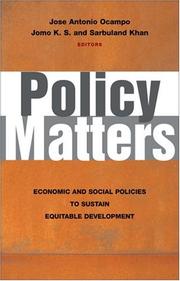
ISBN: 9781842778364 Year: 2007 Publisher: New York Zed Books
Abstract | Keywords | Export | Availability | Bookmark
 Loading...
Loading...Choose an application
- Reference Manager
- EndNote
- RefWorks (Direct export to RefWorks)
AA / International- internationaal --- 338.8 --- 339.21 --- 338.340 --- 313 --- 201 --- Economische groei --- Ongelijkheid en herverdeling van vermogens en inkomens. Inkomensbeleid --- Algemene ontwikkeling in de Derde Wereld --- Levenswijze en levensstandaard. Levensminimum. sociale indicatoren (Studiën) --- Sociologie: algemeenheden
Book
ISBN: 9782600011648 2600011641 Year: 2007 Volume: 211 Publisher: Genève Droz
Abstract | Keywords | Export | Availability | Bookmark
 Loading...
Loading...Choose an application
- Reference Manager
- EndNote
- RefWorks (Direct export to RefWorks)
« Les inégalités se creusent… ». « Il faut réduire les inégalités ! ». Quiconque peut lire ou entendre quotidiennement ces lieux communs en forme de slogan. Or, ils ne seraient fondés qu'à la condition de pouvoir comparer, dans un domaine spécifique (celui des revenus, celui de la santé, etc.), des situations distinctes et, à partir de ces dernières, déduire une plus ou moins grande inégalité. Malheureusement, une analyse approfondie et sans a priori idéologique de la notion même d'inégalité et de la logique de la comparaison montre qu'en l'espèce on se heurte souvent à une impossibilité : les inégalités ne sont pas toujours comparables, toute « mesure » de celles-ci s'exposant à l'incohérence et risquant d'aboutir à une impasse méthodologique. Marc Barbut relève l'ambiguïté de ces questions et examine les principales théories de l'inégalité, ainsi que leur histoire depuis Vilfredo Pareto.
Equality --- Social sciences --- Egalité (Sociologie) --- Sciences sociales --- Comparative method --- Méthode comparative --- AA / International- internationaal --- 311.98 --- 313 --- 339.21 --- Bevolking naar de maatschappelijke klasse en stand. Wet van Pareto. --- Levenswijze en levensstandaard. Levensminimum. sociale indicatoren (Studiën). --- Ongelijkheid en herverdeling van vermogens en inkomens. Inkomensbeleid. --- Egalité (Sociologie) --- Méthode comparative --- Bevolking naar de maatschappelijke klasse en stand. Wet van Pareto --- Levenswijze en levensstandaard. Levensminimum. sociale indicatoren (Studiën) --- Ongelijkheid en herverdeling van vermogens en inkomens. Inkomensbeleid --- Income distribution --- Social stratification --- Mathematical models.
Book
ISBN: 9789264029101 9264029109 9264029117 Year: 2007 Publisher: Paris : OCDE-Organisation de cooperation et de developpement economiques,
Abstract | Keywords | Export | Availability | Bookmark
 Loading...
Loading...Choose an application
- Reference Manager
- EndNote
- RefWorks (Direct export to RefWorks)
Cette première publication de la série Les essentiels de l’OCDE examine l’importance grandissante du capital humain dans la vie économique et sociale – notre éducation, nos qualifications, nos compétences et notre savoir. Alors que l'économie des pays développés se tertiarise, le succès économique des individus et des économies nationales dépend de plus en plus de la qualité du capital humain. Enrichir ce capital devient donc une priorité majeure des pouvoirs publics, notamment pour les travailleurs peu qualifiés qui risquent d’être marginalisés davantage. Mettre l’accent sur le développement de la petite enfance, améliorer la qualité et le choix de l’enseignement scolaire, viser l’excellence dans les établissements d’enseignement supérieur, et enfin faciliter l’accès à l’éducation et à la formation des adultes, sont quelques unes des pistes suivies. S’inspirant d’études et d’analyses de l’OCDE, cette publication dynamique explique en termes simples comment les pays de l’OCDE relèvent le défi et tentent d’augmenter leur capital humain.
Human capital. --- Labor supply --- Ressources humaines --- Marché du travail --- Effect of education on. --- Effets de l'éducation sur --- Apprentissage Leerproces --- Enseignement Onderwijs --- Politique de formation Opleidingsbeleid --- Compétences Bevoegdheden --- AA / International- internationaal --- 313 --- 470 --- 203 --- Levenswijze en levensstandaard. Levensminimum. sociale indicatoren (Studiën). --- Openbaar onderwijs: algemeenheden. --- Sociografie. Algemene beschrijving van de gemeenschappen (Sociologie). --- Marché du travail --- Effets de l'éducation sur --- Levenswijze en levensstandaard. Levensminimum. sociale indicatoren (Studiën) --- Openbaar onderwijs: algemeenheden --- Sociografie. Algemene beschrijving van de gemeenschappen (Sociologie) --- Transportation --- Economic development. --- Environmental aspects.
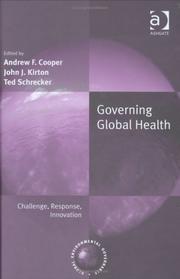
ISBN: 9780754648734 9781315585550 9781317125662 9781317125679 Year: 2007 Publisher: Aldershot Ashgate
Abstract | Keywords | Export | Availability | Bookmark
 Loading...
Loading...Choose an application
- Reference Manager
- EndNote
- RefWorks (Direct export to RefWorks)
AA / International- internationaal --- 311.6 --- 313 --- 351.2 --- Gezondheidstoestand van de bevolking. --- Levenswijze en levensstandaard. Levensminimum. sociale indicatoren (Studiën). --- Openbare gezondheid. Milieubescherming. Milieuvervuiling. --- Public health --- World Health. --- International Cooperation. --- International cooperation. --- World health. --- International agencies --- Medical assistance --- Public health laws, International --- World health --- International cooperation --- Gezondheidstoestand van de bevolking --- Levenswijze en levensstandaard. Levensminimum. sociale indicatoren (Studiën) --- Openbare gezondheid. Milieubescherming. Milieuvervuiling --- Group of Eight (Organization) --- G8 (Organization) --- Группа восьми (Organization) --- Gruppa vosʹmi (Organization) --- Group of Seven (Organization)
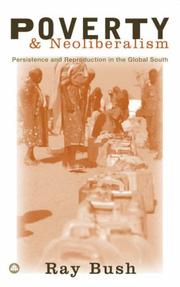
ISBN: 0745319602 0745319610 9780745319605 9780745319612 1783719346 1849641676 9781849641678 9781783719341 Year: 2007 Publisher: London : Pluto
Abstract | Keywords | Export | Availability | Bookmark
 Loading...
Loading...Choose an application
- Reference Manager
- EndNote
- RefWorks (Direct export to RefWorks)
A critique of the way powerful institutions support economics and politics that sustain poverty and keep the rich in power.
AFR / Africa - Afrika - Afrique --- LDC / Developping Countries - Pays En Développement --- MEA / Middle East - Midden Oosten - Moyen Orient --- 338.340 --- 313 --- Algemene ontwikkeling in de Derde Wereld. --- Levenswijze en levensstandaard. Levensminimum. sociale indicatoren (Studiën). --- Capitalism --- Mines and mineral resources --- Neoliberalism --- Social Sciences and Humanities. Development Studies --- Social aspects --- Economic aspects --- Development Economics. --- Africa --- Economic conditions --- Neo-liberalism --- Market economy --- Levenswijze en levensstandaard. Levensminimum. sociale indicatoren (Studiën) --- Algemene ontwikkeling in de Derde Wereld --- Liberalism --- Economics --- Profit --- Capital --- Eastern Hemisphere
Book
ISBN: 082136975X 9780821369760 1462381510 9786610819430 1455225584 128081943X 0821369768 9780821369753 Year: 2007 Publisher: Washington, DC : International Bank for Reconstruction and Development/The World Bank,
Abstract | Keywords | Export | Availability | Bookmark
 Loading...
Loading...Choose an application
- Reference Manager
- EndNote
- RefWorks (Direct export to RefWorks)
The 2007 Global Monitoring Report on the Millennium Development Goals (MDGs) assesses the contributions of developing countries, developed countries, and international financial institutions toward meeting universally agreed development commitments. Fourth in a series of annual reports leading up to 2015, this year's report reviews key developments of the past year, emerging priorities, and provides a detailed region-by-region picture of performance in the developing regions of the world, drawing on indicators for poverty, education, gender equality, health, and other goals. Subtitled "Confronting the Challenges of Gender Equality and Fragile States", this year's report highlights two key thematic areas-gender equality and empowerment of women (the third MDG) and the special problems of fragile states, where extreme poverty is increasingly concentrated. The report, which is jointly issued by the World Bank and the International Monetary Fund, argues that gender equality and the empowerment of women are central to the development agenda. This is because gender equality makes good economic sense and because it helps advance the other development goals-including education, nutrition, and reducing child mortality. Rapid progress has been made in some areas, such as achieving educational parity for girls in primary and secondary school in most countries. But in many other dimensions-including political representation and participation in nonagricultural employment-performance still falls short. Better monitoring and efforts at mainstreaming gender equality requires realistic goals, strong leadership, technical expertise, and financing.
Basic needs -- Developing countries. --- Urban poor -- Government policy -- Developing countries. --- Urbanization -- Developing countries. --- economische ontwikkeling --- economische groei --- internationale financiele markt --- AA / International- internationaal --- LDC / Developping Countries - Pays En Développement --- 338.340 --- 313 --- développement économique --- croissance economique --- marché international financier --- Algemene ontwikkeling in de Derde Wereld. --- Levenswijze en levensstandaard. Levensminimum. sociale indicatoren (Studiën). --- Algemene ontwikkeling in de Derde Wereld --- Levenswijze en levensstandaard. Levensminimum. sociale indicatoren (Studiën) --- World Bank --- Developing countries --- Economic policy.
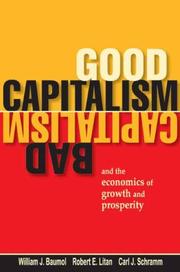
ISBN: 9780300109412 0300109415 9786611734657 1281734659 0300134797 9780300134797 9781281734655 9780300158328 0300158327 6611734651 Year: 2007 Publisher: New Haven Yale university press
Abstract | Keywords | Export | Availability | Bookmark
 Loading...
Loading...Choose an application
- Reference Manager
- EndNote
- RefWorks (Direct export to RefWorks)
Economic order --- Capitalism. --- Entrepreneurship. --- Capitalisme --- Entrepreneuriat --- 330.35 --- 330.342.14 --- AA / International- internationaal --- 338.8 --- 313 --- 330.52 --- Capitalism --- Entrepreneurship --- 330.122 --- Entrepreneur --- Intrapreneur --- Business incubators --- Market economy --- Economics --- Profit --- Capital --- Economische groei. Kwantitatieve toename. Technische vooruitgang --zie ook {338.09} --- Kapitalistische economie. Free enterprise. Markteconomie. Vrije concurrentie --- Economische groei. --- Levenswijze en levensstandaard. Levensminimum. sociale indicatoren (Studiën). --- Liberaal systeem. Neo-liberalisme. Theorie van de onderhandeling. --- 330.342.14 Kapitalistische economie. Free enterprise. Markteconomie. Vrije concurrentie --- 330.35 Economische groei. Kwantitatieve toename. Technische vooruitgang --zie ook {338.09} --- Levenswijze en levensstandaard. Levensminimum. sociale indicatoren (Studiën) --- Liberaal systeem. Neo-liberalisme. Theorie van de onderhandeling --- Economische groei --- E-books
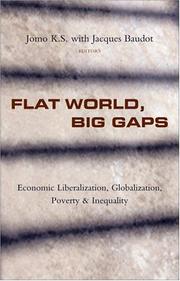
ISBN: 9781842778333 9781842778340 9788125030676 8125030670 Year: 2007 Publisher: London Zed
Abstract | Keywords | Export | Availability | Bookmark
 Loading...
Loading...Choose an application
- Reference Manager
- EndNote
- RefWorks (Direct export to RefWorks)
Third World: economic development problems --- 241 Hedendaagse wereldproblemen --- Globalisering --- AA / International- internationaal --- 313 --- 382.11 --- Levenswijze en levensstandaard. Levensminimum. sociale indicatoren (Studiën). --- Theorie van het internationale evenwicht. Economische onafhankelijkheid van een natie. Globalisering. Mondialisering. --- Economic development. --- Globalization. --- Income distribution. --- Développement économique. --- Mondialisation. --- Revenu --- Social Sciences and Humanities. Economics --- Répartition. --- Economic Conditions, Development and Structure --- Economic Conditions, Development and Structure. --- Développement économique --- Mondialisation --- Répartition --- Developing countries: economic development problems --- Economic development --- Globalization --- Income distribution --- Distribution of income --- Income inequality --- Inequality of income --- Global cities --- Globalisation --- Internationalization --- Development, Economic --- Economic growth --- Growth, Economic --- Levenswijze en levensstandaard. Levensminimum. sociale indicatoren (Studiën) --- Theorie van het internationale evenwicht. Economische onafhankelijkheid van een natie. Globalisering. Mondialisering --- Distribution (Economic theory) --- Disposable income --- International relations --- Anti-globalization movement --- Economic policy --- Economics --- Statics and dynamics (Social sciences) --- Development economics --- Resource curse
| Listing 1 - 10 of 22 | << page >> |
Sort by
|

 Search
Search Feedback
Feedback About UniCat
About UniCat  Help
Help News
News